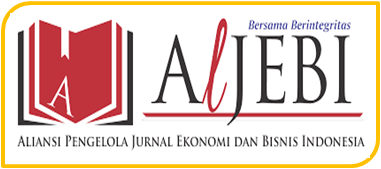Strengthening Village Economy through Village-Owned Business Agencies in Sharia Maqasid
Abstract
BUMDES in recent years has indeed become the subject of conversation, not only by ordinary people but also among researchers and students. This is understandable, because the existence of BUMDES has a strategic role in the midst of society, especially in rural areas. If examined carefully the nature of BUMDES is not merely as a commercial economic institution, but also as a means to improve community welfare, in this study aims to describe the BUMDES Gesang business units. Analyzing the role of BUMDES in strengthening the village economy in the village of Gesang, Tempeh sub-district, Lumajang Regency, which was then reviewed from the perspective of the Islamic maqasid. The research method used in this study is a qualitative research type of research is field research which in data collection using interviews, observation and documentation. While for data analysis techniques, namely by reducing the data presentation of data and drawing conclusions while for checking the validity of the data is to use triangulation. The results of this study can be seen that: Gesang BUMDES business units there are three agricultural units, service units and HIPPA units.
Keywords
Full Text:
PDFReferences
al-Zuhayli, W. (1998). Ushul al-Fiqh al-Islami. Damaskus: Dar al-Fikr. juz II.
Arsyad, L. Ekonomi Pembangunan dan Pembangunan Ekonomi. Accessed from http://www.pustaka.ut.ac.id/lib/wp-content/uploads/pdfmk/ESPA4324-M1.pdf
Chapra, M. U. (2000). Islam dan tantangan ekonomi. Gema Insani.
Chapra, M. U. (2008). The Islamic Vision of Development in The Light of The Maqashid al Syariah. Richmond, UK: The International Institute of Islamic Thouht.
Chapra, M. U. (2016). The future of economics: An Islamic perspective (Vol. 21). Kube Publishing Ltd.
Dewi, A. S. K. (2014). Peranan Badan Usaha Milik Desa (BUMDes) Sebagai Upaya Dalam Meningkatkan Pendapatan Asli Desa (PADes) Serta Menumbuhkan Perekonomian Desa. Journal of Rural and Development, 5(1).
Effendi, S. (2005). Ushul Fiqh. Ed. I, Cet. 6, Jakarta: Prenada Media Group.
Hallaq, W. B. (2010). Sejarah Teori Hukum Islam, Pengantar untuk Usul Fiqih Mazhab Sunni, terj E. Kusnadiningratdan Abdul haris bin Wahid. Jakarta: PT. Raja Grafindo Persada.
Kuncoro, M. (2010). Ekonomi Pembangunan. Jakarta: Erlangga.
Moleong, L. J. (2018). Metode Penelitian Kualitatif, cetakan ke-37. Bandung: PT. Remaja Rosdakarya.
Priadana, M. S. & Muis, S. (2009). Metodologi Penelitian Ekonomi Dan Bisnis. Yogyakarta: Graha Ilmu.
Suryanto, R. (2018). Peta jalan BUMDES sukses. Yogyakarta: PT Syncore Indonesia.
Teropong. (2018). Buletin Balitbang Provinsi Jawa Timur, Edisi 101 September-Oktober.
Tim penyusun kamus pusat bahasa. (2008). Kamus besar bahasa Indonesia. Jakarta: balai pustaka.
Yafie, A. (2006). Merintis fiqh lingkungan hidup. Yayasan Amanah.
DOI: https://doi.org/10.18860/miec.v1i1.12542
Refbacks
- There are currently no refbacks.

This work is licensed under a Creative Commons Attribution-ShareAlike 4.0 International License.
Editorial Office:
Megawati Soekarnoputri Building
Faculty of Economics
Jln. Gajayana 50 Telp (0341) 558881
E-mail: m-iecjournal@uin-malang.ac.id
UIN Maulana Malik Ibrahim Malang
Member of:
Indexed by:
Maliki Islamic Economics Journal under a CC BY SA 4.0 International License.
View My Stats

























